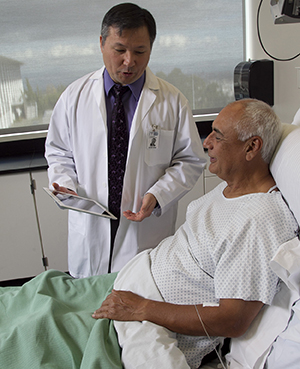Minimally invasive heart surgery can be done for a coronary bypass or heart valve surgery. It uses a smaller cut (incision) than open heart surgery.
On the day of your bypass or valve surgery, a patient educator or a nurse may talk with you and your loved ones. They can tell you what to expect. It's normal to feel a little nervous before surgery. The hospital staff will do all they can to answer your questions and help you relax.
Getting ready for surgery
-
Tell your health care team what medicines you take. This includes all prescription and over-the-counter medicines, herbal supplements, vitamins, cannabis products, and illegal drugs you use. Tell the care team if you take aspirin or blood thinner medicines. Ask if you should stop taking them and, if so, when.
-
If you smoke, stop now. This will help your blood flow and breathing. Do not use any nicotine products. This includes smokeless tobacco products, electronic cigarettes, and vaping devices.
-
The anesthesiologist is the health care provider who gives you anesthesia. This medicine allows you to comfortably sleep during the entire surgery. They will talk to you about this before your surgery. Let them know of any allergies you have or any reactions to anesthesia you've had in the past.
-
If you are having valve surgery and need dental work, you may be told to have it done before surgery. This is because dental work can let bacteria enter the bloodstream. This may cause infection around a new valve. Your health care team may ask your dentist for approval before your surgery can be done.
-
You may be asked if you have an advanced medical directive. This is a document that lets you plan ahead for the care you’d want if you could not express your wishes later. It notes the medical treatment you’d want. It can also name the person you want to make sure your wishes are followed. It's important that your family knows your wishes before your surgery.
Risks and possible complications
Risks and possible complications of this surgery include:
-
Lung problems, such as pneumonia.
-
Severe bleeding that may require transfusion of blood products.
-
Infection, including infections in the incision or incisions.
-
Nerve injury.
-
Damage to bones and muscles.
-
Problems from anticoagulant medicine if you had valve surgery.
-
Heart attack, stroke, or death.
-
Problems with your heart’s rhythm that mean you need to take medicines or have a pacemaker implanted.
-
Damage to the blood vessels in the legs, if the surgeon uses these for heart surgery.
-
Needing to change from minimally invasive surgery to an open surgery that uses a large incision.
Featured in



